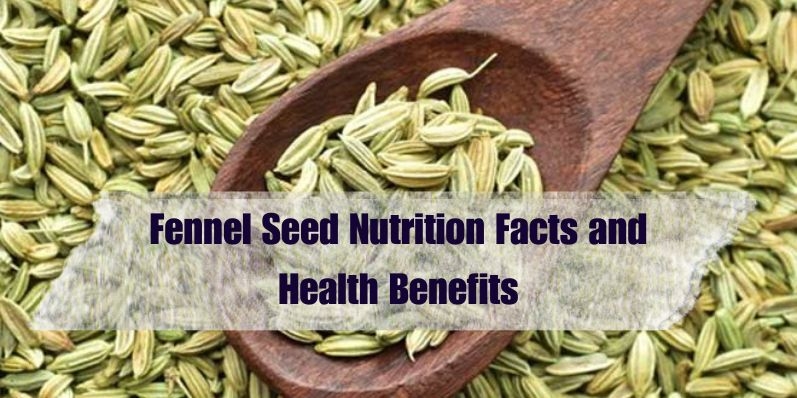
23-07-2023
Fennel Seed Nutrition Facts and Health Benefits
- Admin
Fennel seeds, scientifically known as Foeniculum vulgare, are aromatic and flavorful seeds that have been widely used in culinary and medicinal applications for centuries. These small seeds come from the fennel plant, which is native to the Mediterranean region but is now cultivated in various parts of the world. Fennel seeds not only add a unique taste to dishes but also offer numerous health benefits. In this article, we will explore the nutrition facts and delve into the incredible health benefits of fennel seeds.
Nutrition Facts of Fennel Seeds
Fennel seeds are a rich source of various essential nutrients that contribute to overall health. Here is a breakdown of the nutrition facts for one tablespoon (6.8 grams) of fennel seeds:
- Calories: 19
- Carbohydrates: 3.9 grams
- Fiber: 1.8 grams
- Protein: 0.7 grams
- Fat: 0.3 grams
- Vitamin C: 1.3 milligrams (2% of the daily recommended intake)
- Potassium: 49.9 milligrams (1% of the daily recommended intake)
- Calcium: 37.6 milligrams (4% of the daily recommended intake)
- Iron: 0.6 milligrams (3% of the daily recommended intake)
Health Benefits of Fennel Seeds
1. Rich in Antioxidants
Fennel seeds are loaded with antioxidants, such as flavonoids, polyphenols, and essential oils. These powerful compounds help neutralize harmful free radicals in the body, reducing oxidative stress and lowering the risk of chronic diseases.
2. Digestive Aid
Fennel seeds have been traditionally used as a digestive aid due to their carminative properties. Chewing on a few fennel seeds after a meal can help alleviate bloating, gas, and indigestion. Additionally, fennel seeds may stimulate the production of digestive juices, promoting better digestion.
3. Anti-Inflammatory Properties
The presence of flavonoids and other anti-inflammatory compounds in fennel seeds can help reduce inflammation in the body. Regular consumption of fennel seeds may offer relief to individuals suffering from inflammatory conditions.
4. Supports Heart Health
Fennel seeds contain potassium, which is essential for maintaining heart health. Potassium helps regulate blood pressure and heart rate, reducing the risk of cardiovascular diseases.
5. Aids in Weight Management
The fiber content in fennel seeds promotes a feeling of fullness, which can help control appetite and prevent overeating. Including fennel seeds in your diet can be beneficial for those aiming to manage their weight.
6. Improves Respiratory Health
Fennel seeds possess expectorant properties, which means they can help loosen mucus and phlegm in the respiratory tract. This makes fennel seeds beneficial for individuals dealing with coughs, bronchitis, and other respiratory issues.
7. Menstrual Symptom Relief
For women experiencing menstrual discomfort, fennel seeds may provide relief due to their antispasmodic properties. Consuming fennel tea or chewing on fennel seeds can help ease menstrual cramps.
8. Bone Health
Fennel seeds contain calcium, which is essential for maintaining strong and healthy bones. Adequate calcium intake can contribute to reducing the risk of osteoporosis and bone-related disorders.
How to Incorporate Fennel Seeds into Your Diet
There are several delightful ways to include fennel seeds in your daily diet:
Fennel Tea: Steep a teaspoon of fennel seeds in hot water to make a soothing and aromatic fennel tea.
Spice Blends: Add ground fennel seeds to spice blends, such as garam masala, to enhance the flavor of your dishes.
Baked Goods: Sprinkle fennel seeds over bread, cookies, or muffins before baking to impart a pleasant taste.
Salad Enhancer: Add toasted fennel seeds to salads for an extra crunch and burst of flavor.
Fennel-Infused Water: Infuse water with fennel seeds and other fruits or herbs for a refreshing and healthy drink.
Precautions and Considerations
While fennel seeds offer numerous health benefits, it's essential to be mindful of a few precautions:
Allergies: Some individuals may be allergic to fennel seeds. If you experience any allergic reactions, discontinue use and seek medical advice.
Pregnancy and Breastfeeding: Pregnant and breastfeeding women should exercise caution and consult a healthcare professional before consuming fennel seeds in large quantities.
Medication Interactions: If you are taking medications, especially blood thinners or medications for hypertension, consult your healthcare provider before using fennel seeds medicinally.
Conclusion
Fennel seeds are more than just a culinary spice; they are a treasure trove of health benefits. With their impressive nutritional profile and various therapeutic properties, fennel seeds have been valued for their contribution to overall well-being. From aiding digestion to supporting heart health and respiratory functions, fennel seeds offer a host of advantages that make them a valuable addition to any balanced diet. So, consider incorporating fennel seeds into your daily meals and experience the remarkable benefits they have to offer.